

'Digital Detox' Becomes A Real-Life Word, Gets Added To Oxford Dictionary Online. Life Lessons We Learned From The First Day of School (That Still Stay With Us) Columnist Leigh Newman looks back on the dos and don’ts of that horrible, wonderful first day back in the classroom -- and how they apply to us today.
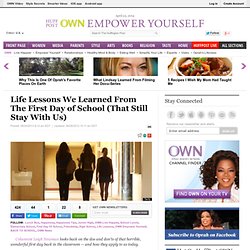
By Leigh Newman The First Person Who Talks To You Isn’t Necessarily Your New Best Friend You may want her to be your best friend. In fact, way back in seventh grade when you were sitting at a lunch table alone, knowing no one in that whole cafeteria full of laughing, seat-saving people, she may have seemed as if she could be such a person -- as long as you ignored her bubbling enthusiasm for Wednesday’s after-school "Coven Club.
" And so you invited her over to spend the night. Six months later, you realized you’d spent most of your junior-high experience hanging out in her room, chanting ineffective, creepy spells until you finally admitted to yourself that you two had nothing in common. At the end of 10th grade, after when we had turned in our papers on time and not chewed any gum, she threw us a party. Coding Is Coming To Every Industry You Can Think Of, Time To Start Learning It Now. Not every coder job involves working in a blue chip tech company or Silicon Valley startup.

As British technologist, Conrad Wolfram said in a TED talk on teaching math with computers: "In the real world math isn’t necessarily done by mathematicians. It’s done by geologists, engineers, biologists, all sorts of different people. " The same applies for computer science. Just ask Alex Tran, fellowship program manager at Code for America, a nonprofit "civic startup accelerator" that sees coding as a new form of public service. Each year, he works with more than 20 startups and fellows who build a variety of apps and online programs to improve how citizens engage and interact with their communities. "Coding literacy is a huge part of our future as a country, and it will be integrated into every aspect of our government and every other sector that people will work in," says Tran. Computer science is transforming industries—and igniting a renaissance in the creating of things. Ashton Kutcher Just Told A Bunch Of Teenagers How To Be Sexy, In The Smartest Way Ever.
Watch A Talk Show Host Get Remarkably Profound. Seriously, Just Watch Him For 3 Minutes. If Disney Princesses Had Instagram. Werner Herzog On His Devastating Anti-Texting-And-Driving Doc. If you had to make a list of filmmakers who are unlikely to partner with a brand on a major new campaign, Werner Herzog’s name would probably be near the top.
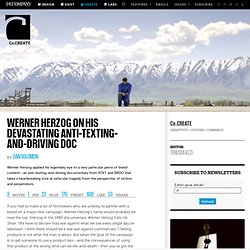
(Herzog in the 1980 documentary Werner Herzog Eats His Shoe: “We have to declare holy war against what we see every single day on television. I think there should be a real war against commercials. ") Selling products is not what the man is about. But when the goal of the campaign is to get someone to use a product less--and the consequences of using that product at the wrong time can be life-and-death--then you’ve got the legendary German director’s attention.
That’s how Herzog came to direct to the documentary From One Second to the Next, which is part of the "It Can Wait" anti-texting-and-driving campaign from AT&T and agency BBDO New York. Herzog has documented people at the extremes of life before. “There was always a guiding principle. “Much of the traffic now in messages is mostly banalities. University: Building a world-class engineering organization. As Twitter has scaled, so too has our engineering organization.
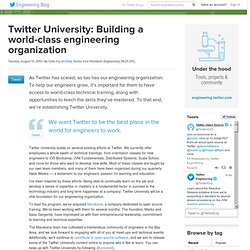
To help our engineers grow, it’s important for them to have access to world-class technical training, along with opportunities to teach the skills they’ve mastered. To that end, we’re establishing Twitter University. We want Twitter to be the best place in the world for engineers to work.Tweet Twitter University builds on several existing efforts at Twitter. We currently offer employees a whole swath of technical trainings, from orientation classes for new engineers to iOS Bootcamp, JVM Fundamentals, Distributed Systems, Scala School, and more for those who want to develop new skills.
I’ve been inspired by these efforts. To lead the program, we’ve acquired Marakana, a company dedicated to open source training. The Marakana team has cultivated a tremendous community of engineers in the Bay Area, and we look forward to engaging with all of you at meet-ups and technical events. Yes, Gmail users have an expectation of privacy. Consumer groups are up in arms today over a motion Google made in June to dismiss a class-action lawsuit alleging that Gmail violates federal and state wiretapping laws by scanning emails at the server level.
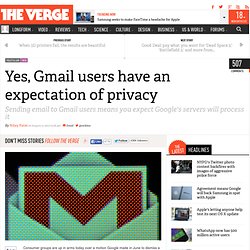
Google's full filing runs 39 pages, but it's just one argument about halfway through that's causing all the trouble: Just as a sender of a letter to a business colleague cannot be surprised that the recipient's assistant opens the letter, people who use web-based email today cannot be surprised if their emails are processed by the recipient's [email provider] in the course of delivery. Indeed, "a person has no legitimate expectation of privacy in information he voluntarily turns over to third parties. " This line has been widely misinterpreted to make it seem like Google is saying Gmail users have no expectation of privacy when they use Gmail, and the outrage is thick.
Unfortunately for outrage junkies, there's just nothing here. And then, two paragraphs after the Smith v. Google: Email Users Can't Legitimately Expect Privacy When Emailing Someone On Gmail (UPDATED) (See correction below) Google doesn't believe that people can reasonably expect their emails to stay private when emailing a Gmail user, even if they don't use Gmail.
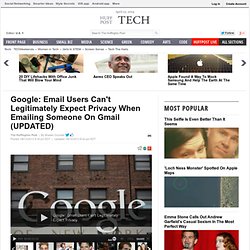
Google: don't expect privacy when sending to Gmail. People sending email to any of Google's 425 million Gmail users have no "reasonable expectation" that their communications are confidential, the internet giant has said in a court filing.
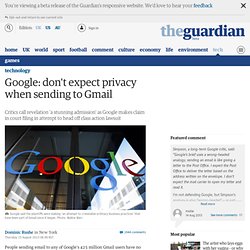
Consumer Watchdog, the advocacy group that uncovered the filing, called the revelation a "stunning admission. " It comes as Google and its peers are under pressure to explain their role in the National Security Agency's (NSA) mass surveillance of US citizens and foreign nationals. "Google has finally admitted they don't respect privacy," said John Simpson, Consumer Watchdog's privacy project director.